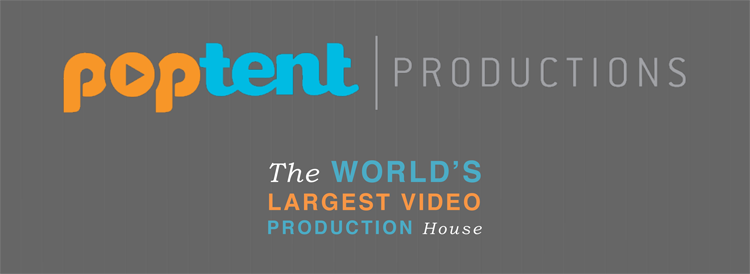Are you a member of Poptent.net? If so, congratulations…you are now part of the “World’s Largest Video Production House!” That’s right; last week Poptent announced the official launch of their very own production company, Poptent Productions. From now on, Poptent isn’t just going to be running video assignments; they’re going to be producing video content for their clients. In some cases those videos will actually be produced in Poptent’s new production space. But the people that write, direct, shoot and edit these videos won’t be Poptent employees. Poptent will instead farm this work out to their most talented members. So if you’ve made a few sales or even if you just uploaded a really impressive demo reel, you might get hired by Poptent to create a video for one of their clients. And when I say “hired” I mean that you wouldn’t have to compete against other filmmakers. You would produce a video and it would be a guaranteed purchase. Poptent has been running a beta version of this program for months and so far companies like Dell, Intel, Jaguar and General Mills have signed on and hired Poptent (and consequently, poptent creators) to produce videos for them. Here’s how Poptent is pitching this endeavor to potential new clients:
Poptent Productions is the world’s largest video production house. We have thousands of fully-vetted filmmakers and videographers across the United States and in over 125 countries ready to work on your next video project. We are the faster, more nimble alternative to traditional video production methods. There is no project that we cannot handle quickly, efficiently and cost effectively. Need to shoot in multiple locations simultaneously and in a variety of languages? Poptent is your solution. We can streamline your process and facilitate greater go-to-market agility.
So from now on, Poptent will be running open video assignments for some clients and for others they will be hiring individual filmmakers to produce videos. That means that there are now two ways that filmmakers can make money on Poptent. And that’s great…right?
Well to be honest, I’m not sure I like this new direction that Poptent is heading in. Poptent is a CROWDSOURCING website. Crowdsourcing is about THE CROWD. Hiring a production company that assigns the gig to a producer is pretty much the exact opposite of crowdsourcing. The original premise behind Poptent was that anyone, anywhere had an equal chance of selling their work to a world famous brand. But now “Poptent Productions” feels like just another corner of the industry that most of us little guys will never be able to break into. Don’t get me wrong; I think Poptent Productions will probably be a big success. But I’m worried that its success will mean fewer opportunities to make money for the vast majority of filmmakers that currently use the site. From now on, when a member of the Poptent staff pitches their services to a brand, they’ll be able to offer two different options:
OPTION 1: Poptent can run a video assignment and open it up to all the members of the Poptent community (or to just a few dozen members in an invite-only assignment.) The brand will create a brief and filmmakers will decide whether or not they want to follow it. There is no guaranteeing how many submissions will be uploaded and there is no guaranteeing that any of the submissions will be usable. But the brand will have to commit to purchasing at least one submission for $7,500 to $10,000. The biggest benefit of running an open assignment is that the brand may get lucky and receive an amazing, outside-of-the-box video that only an undiscovered “crowdsourcer” could come up with.
OPTION 2: Poptent Productions can oversee the creation of any type of video the brand wants. Poptent will consult with the sponsor and then hand-pick one or more of their 50,000 members to write/direct/shoot/edit the project. The filmmakers will be paid about $7,500 to $10,000 for their work. The biggest benefit of Poptent Productions is that there is essentially no risk with this option. The brand will know exactly what they are getting. So while they probably won’t get something “magical” they are guaranteed to get a decent, well-made video.
If you worked for a company that needed some video content, which option would you choose? Would you take a risk and run an assignment in the hopes you might get a phenomenal video? Or would you play it safe and just hire Poptent to create the content you need? If you go with OPTION 1 and the assignment is a flop, you’re on the hook for blowing about $25,000 worth of your company’s money. (It costs about $25,000 to run a video assignment on poptent.) How would you like to tell your boss that you spent $25K and didn’t get one single, usable video?
So OPTION 2 is basically a risk-free alternative to a traditional Poptent assignment. That should make Poptent’s clients very happy but I think it might be a raw deal for filmmakers. I have a feeling that people are going to contact Poptent about running a crowdsourced assignment but then they’ll chicken out and go the safe route when the staff tells them about Poptent Productions. So in a very real sense, Poptent is now competing with their members for gigs. And since Poptent employees are the ones who will help companies decide which kind of assignments to run, the deck is not exactly stacked in your favor.
So Poptent Productions might wind up taking money away from “the crowd” and giving it to a handful of proven producers. If you’re hoping that maybe you’ll get offered one of these “direct paying” gigs you probably shouldn’t get your hopes up. The odds are just not in your favor. Even if Poptent Productions produces 52 videos a year and even if they hire 52 filmmakers, that still means that only .001% of members will be getting any work. And since I don’t think Poptent Productions will double the company’s business, brands that would have run open assignments in the past will instead hire Poptent to make their videos. That means fewer public assignments and fewer oppertunities for 99.999% of the site’s members.
And that’s kind of a bummer! This whole story makes me think of the old saying; You gotta dance with the one that brung ya. Poptent Productions will probably wind up being fantastic for a tiny number of very talented filmmakers. But Poptent has succeeded because of the work done by ALL of their members; not just the ones that have made 8 or 9 sales. Those 50,000 filmmakers mentioned in Poptent’s press releases joined the site because they wanted to have a shot at making some money. They didn’t join so that they could be part of an impressive statistic. It will be a real shame if Poptent Productions causes there to be fewer public assignments but I’m afraid that’s exactly what’s going to happen. And if Poptent is just going to turn into another production company, where does that leave those of us in the 99% that will never be offered a seat at the table?
4/20/12 UPDATE: This story continues in the comment section. Mark Schoneveld from Poptent posted a response and explained Poptent’s motivations for creating their production company. And Kerry Gaffney of Mofilm also left a comment describing a similar program that Mofilm is now running. So if you’ve read this far, click the comments button and keep reading!


 Posted in
Posted in  Tags:
Tags: 



Hey Beardy,
Yet another great post! MOFILM also has its own production element, which we call MOFILM Pro and you’re only entitled to be part of the Pro community if you’re a previous winner.
I can see your concerns with the production model for a crowdsourcing agency and I think I can set your mind at rest although only from the MOFILM POV. Since we’ve introduced MOFILM Pro, which has been running for about 14 months now we’ve actually seen the contest part of the business go from strength to strength, we’ve ran 29 briefs so far this year, with 11 still open (Jamie Oliver, Samsung Global Blogger and 9(!) for Cannes) and we’re running more events this year too – the recent Palm Spring contest for example.
We’re also seen our production business grow but not at the same rate and we are seeing very distinct uses of clients between the two models which we are fairly confident means that the open crowdsourcing part will not suffer from the production.
The reasons behind a client deciding to do a Pro project, or that we recommend it, are usually all related to a desire for fresh thinking but something that a general crowdsourcing contest cant’ provide, or at least not well. So it could be there is an incredibly quick turnaround, a client recently wanted a video in less than two weeks from concept to premiere and that needed to include a few days for their partner approval process – we just couldn’t have done that with an open contest.
It could be quite a technical video, another client works in oil discovery. For them working directly with one filmmaker ensured they got accurate information into the video easily. Or it could be that the client wants to create something under NDA. We do also include crowdsourcing elements in the Pro side, we frequently ask 50 or more filmmakers to submit treatments and then work with the client to select the one who will go into production.
For the open contests, clients love the variety and with the production grant scheme, there’s no longer such a lottery on what the results might be for them. They also love coming to our events and meeting their winners, seeing the other work and then getting the bragging rights if their film takes the overall prize at the end of the night. The contest model is also a more cost effective way of getting multiple videos. There is also a fair amount of cross-over of clients running an open contest and commissioning directly through MOFILM Pro.
Finally for our filmmakers we think it’s a way of saying thanks and putting even more money into their pocket. The contests are great but there can be only one winner and a for the other hundred or so it can be a disappointing experience after all the effort that goes in. With Pro, the odds are better and the initial effort required is less.
So, huge comment – in conclusion, I wouldn’t worry about production taking away from the true crowdsourcing element, at least not where MOFILM is concerned.
Kerry,
Thanks very much for the comment. It does sound like their are important differences between what poptent productions will do and what Mofilm Pro does. I think one reason that a company would run a mofilm contest is because they want the publicity (and fun) that comes with being involved with a film festival or other event. Plus videos that win mofilm contests tend to be more…artistic. And it’s really hard to just hire someone to be artistic. It sounds like clients hire Mofilm Pro when they just need something fast and commercial.
On the other hand, the videos that win poptent assignments tend to be more commercial. If a brand has a basic idea of what they want and they don’t need anything too “cool” they can just hire Poptent Productions rather than take a gamble and run an open assignment.
To summarize: It sounds like Mofilm Pro offers services that Mofilm contests can’t provide. But Poptent Productions offers services that the Poptent “crowd” already provides.
Beardy, I think you missed a huge part of the story. If Poptent makes $25,000 to run a regular assignment, don’t you think they’d make a lot more if they produce the video? If Poptent can make more money by doing the productions themselves, they will work harder to sell themselves over their members, right?
Hey Dan! Thanks for sharing your thoughts on Poptent Productions – we’re definitely proud of our work within that project and we’re glad to see people dialoging about it.
You know – we’re certainly not viewing Poptent Productions as any kind of replacement for our normal assignments. Quite the contrary! We’re more committed than ever to bring awesome brands into the crowdsourcing space, offering bigger and better opportunities for filmmakers to shine… and make money. You’re right, though. The two projects are most certainly different beasts. If anything, the way they work together will allow us to sell more video from our assignments!
One of our motivations for starting Poptent Productions was that we were consistently getting requests for video creation that didn’t fit into the ideation style of an assignment. Shooting in a car factory, for example. Or shooting a video with a celebrity. These types of productions just didn’t fit into the crowdsourcing model. So instead of telling folks no, we’d excited to be able to accommodate their needs while at the same time funneling more and more work into the Poptent community!
As you mentioned, brands sign up for open assignments because of the ‘amazing, out-of-the-box video’ that they get from the Poptent community. More than half of these brands end up purchasing video from multiple creators – Clinique bought 9 videos, Dell bought 10 – and will continue to use open assignments so they have the option to buy as many ideas as they feel they can use.
Poptent Productions is something that furthers Poptent’s overall commitment to helping filmmakers grow their careers. As you know, there are a lot of aspiring filmmakers out there and we’re doing all we can to help them grow, whether they’ve been part of Poptent for years or days. I think you’ll see what we mean as we get rolling. And don’t hesitate to reach out – we’d be happy to show you some more of the cool stuff we’ve got in the works with Poptent Productions.
Mark,
Thanks for the comment. I’ll cut and paste some of it and ad a POST SCRIPT to the article.
I think I understand why Poptent Productions was created and how it’s being used now. I’m just worried about “mission creep.” Obviously Poptent can’t run an open assignment where 100 people all film videos with Betty White or in a car factory. So direct assignments make sense for those types of shoots. But I’ve worked with marketing people before and I know human nature. If people are offered an option that has zero chance of making them look bad in front of their bosses, many of them will take it. And if you look through old poptent assignments, I bet you’ll see a lot of them that would have been run as Poptent Productions assignments.
For instance, two years ago Harley Davidson ran an assignment to promote the Harley Davidson museum in Milwaukee. It seemed like Harley wanted people to shoot at the museum so I drove all the way from the Chicago area to Milwaukee and did just that. And harley bought my video. It was my first ever poptent sale. If Harley were to run that assignment today, it would almost certainly be a Poptent Productions assignment and Poptent would just hire someone in Milwaukee to do the shoot.
I just want to take a minute to shout out to Beardy for producing such a quality site. It’s a testament to the worthwhile dialogue that you try to create around our video contest community that people from Poptent and Mofilm took the time to come here and leave detailed comments about their worlds. Your blog really is an asset to our community and I appreciate the time you take to do your stories (even if 1 out of every 5 requires me to vote for you
Wow well thanks Joel!
Oh and I just checked….I’ve only done two “please for my video posts” in like the last 5 months!
I was just giving you the business.
Beardy,
I visit your web site regularly and usually don’t comment too often, but this story really struck a chord with me. I have been working as a videographer for over 14 years now, started my own production company and live in the Phoenix, AZ area. My clients range from small mom and pops, to non-profits to national companies. Along with my production partner, we have also produced several national TV commercials and we came in 2nd and 5th in the two GoDaddy Spots (fingerfighting.com and isawbigfoot.co).
I signed up to Poptent a year or so ago but have yet to actually make a spot for one of their contests. Part of this being that their $7500 payouts don’t quite motivate me as much as some of the other larger contests do, but not because of what the filmmakers make, more about what Poptent (the middleman) makes off you. Yes, you could look at this in two ways, they are like an ad agency hiring you to produce work for their clients, but I have always just felt a bit strange about the way the whole thing works.
I have a few friends here who have competed in their contests and won so now one of them is getting pre-paid gigs so as you said, once you are in the door, it can serve you well with work as long as your quality keeps up or I guess as long as you are not replaced by one of the other filmmakers in their database.
This new Poptent Pro though sounds like they are just taking another step in the direction that leaves me unsettled. Isn’t this a lot like that company TurnHere? They outsource work to filmmakers or videographers across the country, double or triple the price and make money from you. Again, some will say this is a great way for people who are not connected to find work and get paid some decent money but it also is greatly taking away from the experience of owning a small company and forming relationships with clients.
One of my favorite parts of owning a business is the first communications with a client where you get to pitch your idea, meet about the proposed concepts, submit an estimate and then hopefully get the job. I just had the pleasure of working with The Blue Flame Agency out of NY that Sean Combs owns. Just out of happenstance, I was contacted by them at the last minute to film an event in Phoenix. The shoot was great and we made a good enough impression that they said they would make us their go-to video guys in Arizona. A relationship was formed.
If this was Poptent, you don’t have the connection to the actual client and that part is kind of sad to me. Maybe I am a bit old-school but Poptent or the way clients are using them to create viral videos and commercials just doesn’t sit all that well with me. I still might enter one of their contests some day, so again, not intending these comments to make them out to be horrible as they are providing a service to filmmakers who probably would never have the opportunity to work for these national companies and it’s great on your resume, but just wish it was not set up in such a “mission creep” way as you said.
Just my two cents.
Jae,
Thanks very much for the comment. You were able to articulate a few important points that I didn’t get to talk about in the article. I might have to do a Part II of this story titled “Will Poptent Productions be bad for small production companies?” The answer to that question would have to be “Yes.” And that’s one thing that bothers me about Poptent Productions. Yes they will be sending business to their members but if Poptent Productions didn’t exist, that business would go to small, independent production companies around the US. And those companies would get the full $25,000 (or whatever the price would be.) So it kind of feels like Poptent is jumping in between filmmakers and clients so they can get paid a huge amount of money to act as middlemen. One $25,000 gig for an tiny production company would be a game-changer. So poptent is kind of taking big jobs away from guys like you and then giving small jobs to different guys like you.
Beardy,
Thank you for the follow-up and you nicely summarized what I was expressing. I hope you do write a “Part Two” as I believe this is a very interesting topic and an important one to keep track of…
Beardy,
The biggest problem with the poptent scheme is not the low-percentage chance of your spec work being accepted but the work-for-hire terms of their submission contract.
(disclaimer: I’m not a lawyer, but a production professional.)
In essense, poptent requires you to accept a work-for-hire arrangement EVEN IF YOUR WORK IS NOT ACCEPTED! That means, copyright for your work is transferred to the poptent client the moment you upload the submission, NOT WHEN YOU ARE COMPENSATED FOR YOUR WORK.
In reality, poptent can’t enforce this clause in their contract. It flies in the face of copyright law.
from: http://en.wikipedia.org/wiki/Work_for_hire
“The circumstances in which a work is considered a “work made for hire” is determined by the United States Copyright Act of 1976 as either
” (1) a work prepared by an employee within the scope of his or her employment; or (2) a work specially ordered or commissioned for use as a contribution to a collective work, as a part of a motion picture or other audiovisual work, as a translation, as a supplementary work, as a compilation, as an instructional text, as a test, as answer material for a test, or as an atlas, if the parties expressly agree in a written instrument signed by them that the work shall be considered a work made for hire. (17 U.S.C. § 101)”
Since singular video submissions by freelance contributors do not satisfy any of the above tests for a WFH, poptent clients cannot seize copyright from the content creators.
Further, a WFH presumes the creator is being compensated for the creation (“specially ordered or commissioned”) ie: is actually “hired” for the work. Since submissions to the poptent site are on a purely speculative basis and such submissions are not guaranteed to receive compensation, poptent clients cannot receive copyright until they have compensated the creator.
Poptent may require a holding period during which the client may choose additional submissions but copyright is not transferred until such time as compensation has been made. (In the film industry, this is call an “option” and one is typically compensated for that as well.)
Michael Morlan